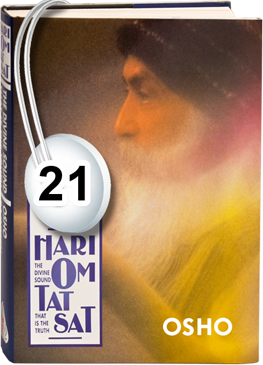Logic Creates Contradictions
Talk #21 from Hari Om Tat Sat: The Divine Sound - That Is the Truth
In stock
"I am in absolute agreement with you. Do you see the contradiction? Logic has interpreted that which is complementary as contradictory. And logic rules our education, our minds, so whenever we see two complementary things..."
"I am in absolute agreement with you. Do you see the contradiction? Logic has interpreted that which is complementary as contradictory. And logic rules our education, our minds, so whenever we see two complementary things..."
Osho continues:
"The old body is tired. You need more experiences to become mature. You have to move through many other forms of life, and there are millions of forms of life.
"Moving through all these forms of life, learning by and by, step by step, inch by inch, you arrive at humanity. Humanity gives you a new opportunity of transformation, to jump out of the circle of life and death and to become part of the eternal. Those who achieve it have really lived. Those who have missed may have to learn again the old route. Who knows how many lives it takes to recognize that humanity is a point of departure, not only from death, but also from life – life as you know it – to a new immortality, to a life which can be equivalent to godliness.
"Logic has created many misunderstandings. It goes on insisting on the duality of things without seeing the interconnecting link.
"I am reminded of one incident.
"Mahatma Gandhi and Muhammad Ali Jinnah, both were fighting for the freedom of India. There was only one difference between them. That was, Muhammad Ali Jinnah wanted Pakistan as a separate country, only for Mohammedans – a Muslim state – and Gandhi wanted the whole of India to remain one big and vast country. They fought continuously, and the British empire depended on their agreement. Unless they agreed…the British empire went on saying: 'You are not in agreement yourselves, and we don't want to leave the country in a chaos. If we leave it in a chaos, without any decisive guidelines, there will be tremendous massacres, and the whole responsibility will be ours.'
"This was their politics. Jinnah was very stubborn. Finally, seeing the situation – either you have to remain slaves or you have to divide the country – Gandhi agreed on the division. India became two countries.
"What I want to point out is that they both had become so much attached in fighting with each other, that they were almost intimate friends. Jinnah felt, in Karachi, the capital of Pakistan, very lonely without Gandhi; he lost all interest. And here in New Delhi, Gandhi, who used to say that he was going to live to one hundred and twenty-five years, dropped the idea and said, 'I want to die as soon as possible."
"Moving through all these forms of life, learning by and by, step by step, inch by inch, you arrive at humanity. Humanity gives you a new opportunity of transformation, to jump out of the circle of life and death and to become part of the eternal. Those who achieve it have really lived. Those who have missed may have to learn again the old route. Who knows how many lives it takes to recognize that humanity is a point of departure, not only from death, but also from life – life as you know it – to a new immortality, to a life which can be equivalent to godliness.
"Logic has created many misunderstandings. It goes on insisting on the duality of things without seeing the interconnecting link.
"I am reminded of one incident.
"Mahatma Gandhi and Muhammad Ali Jinnah, both were fighting for the freedom of India. There was only one difference between them. That was, Muhammad Ali Jinnah wanted Pakistan as a separate country, only for Mohammedans – a Muslim state – and Gandhi wanted the whole of India to remain one big and vast country. They fought continuously, and the British empire depended on their agreement. Unless they agreed…the British empire went on saying: 'You are not in agreement yourselves, and we don't want to leave the country in a chaos. If we leave it in a chaos, without any decisive guidelines, there will be tremendous massacres, and the whole responsibility will be ours.'
"This was their politics. Jinnah was very stubborn. Finally, seeing the situation – either you have to remain slaves or you have to divide the country – Gandhi agreed on the division. India became two countries.
"What I want to point out is that they both had become so much attached in fighting with each other, that they were almost intimate friends. Jinnah felt, in Karachi, the capital of Pakistan, very lonely without Gandhi; he lost all interest. And here in New Delhi, Gandhi, who used to say that he was going to live to one hundred and twenty-five years, dropped the idea and said, 'I want to die as soon as possible."
| Publisher | Osho International |
|---|---|
| Duration of Talk | 76 mins |
| File Size | 20.06 MB |
| Type | Individual Talks |



The information below is required for social login
Sign In or Create Account
Create New Account